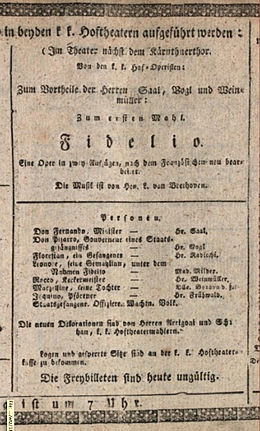
Back Fidelio ALS فيديليو Arabic فيديليو ARZ Фиделио Bulgarian Fidelio Catalan Fidelio Czech Fidelio Welsh Fidelio Danish Fidelio German Φιντέλιο Greek
| Fidelio | |
|---|---|
| Opera by Ludwig van Beethoven | |
 Fidelio, playbill of the third and finalized premiere at the Kärntnertortheater in Vienna, 23 May 1814 | |
| Librettist | Originally prepared by Joseph Sonnleithner, from the French of Jean-Nicolas Bouilly. Later shortened by Stephan von Breuning and edited by Georg Friedrich Treitschke. |
| Language | German |
| Premiere | Original premiere 20 November 1805; reworked version 29 March 1806; finalized version 23 May 1814. First two premieres at Theater an der Wien, Vienna. Final version at Kärntnertortheater, Vienna |
Fidelio (/fɪˈdeɪljoʊ/;[1] German: [fiˈdeːlio]), originally titled Leonore, oder Der Triumph der ehelichen Liebe (Leonore, or The Triumph of Marital Love),[2] Op. 72, is the only opera by German composer Ludwig van Beethoven. The libretto was originally prepared by Joseph Sonnleithner from the French of Jean-Nicolas Bouilly. The opera premiered at Vienna's Theater an der Wien on 20 November 1805. The following year, Beethoven's friend Stephan von Breuning rewrote the libretto, shortening the work from three acts to two. After further work on the libretto by Georg Friedrich Treitschke, a final version was performed at the Kärntnertortheater on 23 May 1814. As these libretto revisions were going on, Beethoven was also revising some of the music. By convention, only the final version is called Fidelio, and the others are referred to as Leonore.
The libretto tells how Leonore, disguised as a prison guard named "Fidelio", rescues her husband Florestan from death in a political prison. Bouilly's scenario fits Beethoven's aesthetic and political outlook: a story of personal sacrifice, heroism, and eventual triumph. With its underlying struggle for liberty and justice mirroring contemporary political movements in Europe, such topics are typical of Beethoven's "middle period". Notable moments in the opera include the "Prisoners' Chorus" (O welche Lust—"O what a joy"), an ode to freedom sung by a chorus of political prisoners, Florestan's vision of Leonore come as an angel to rescue him, and the scene in which the rescue finally takes place. The finale celebrates Leonore's bravery with alternating contributions of soloists and chorus.
- ^ "Fidelio". Dictionary.com Unabridged (Online). n.d.
- ^ Johnson 1998, p. 182.
© MMXXIII Rich X Search. We shall prevail. All rights reserved. Rich X Search